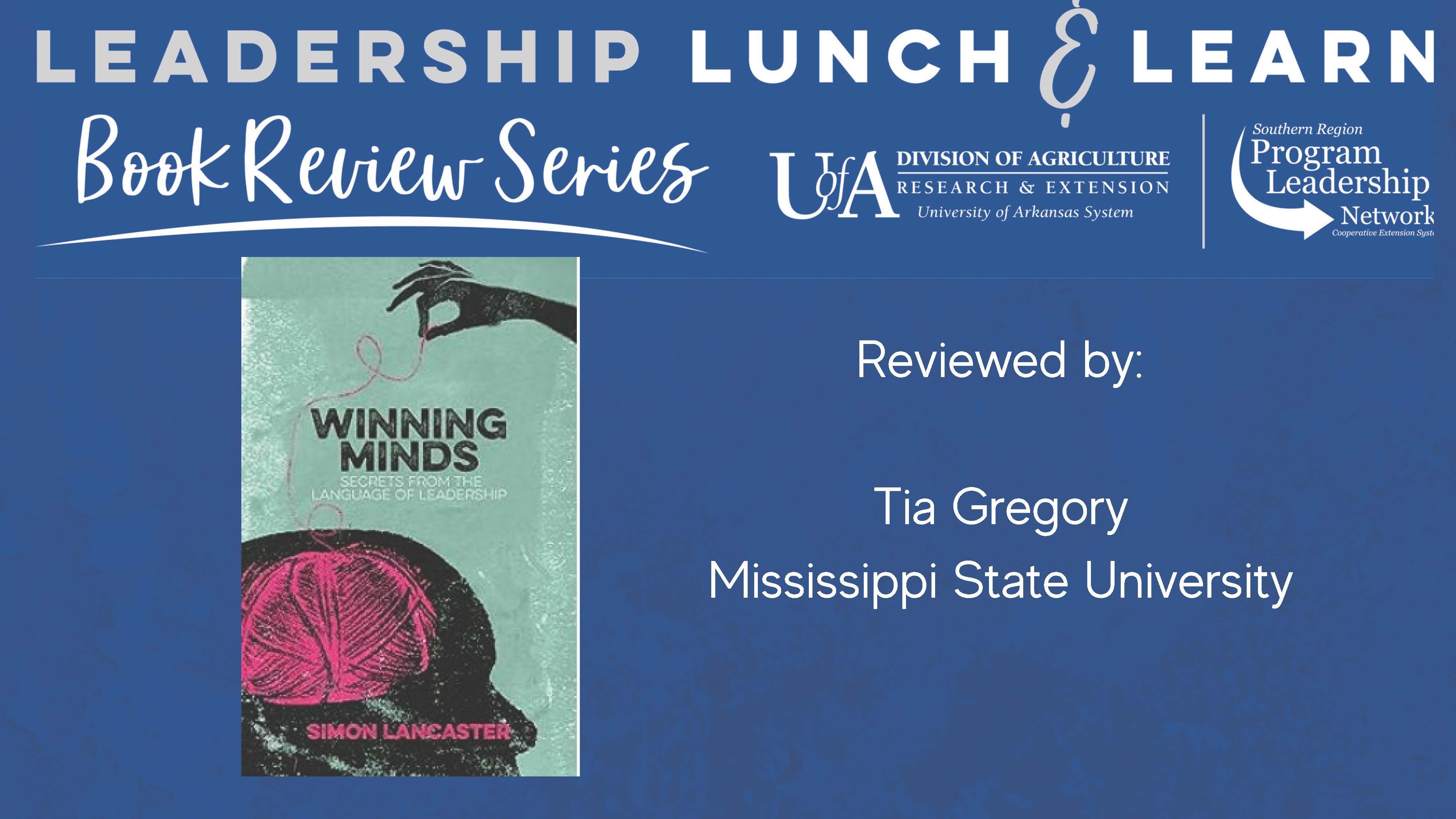Posts
Contact
Lisa Davis
Program Associate-Leadership
Phone: 501-671-2260
Email: ldavis@uada.edu
University of Arkansas System Division of Agriculture
Cooperative Extension Service
2301 S. University Avenue
Little Rock, AR 72204
Leadership Lunch and Learn Book Review: Winning Minds Reviewed by Tia Gregory
 The April Leadership Lunch and Learn focused on Winning Minds: Secrets from the Language
of Leadership by Simon Lancaster, reviewed by Tia Gregory, an Extension instructor
at the Mississippi State University Extension Service.
The April Leadership Lunch and Learn focused on Winning Minds: Secrets from the Language
of Leadership by Simon Lancaster, reviewed by Tia Gregory, an Extension instructor
at the Mississippi State University Extension Service.
View the recording here.
Here are some highlights from her presentation.
Great leaders need:
- Ethos—credibility. Can I trust you?
- Pathos—emotion. Do I care about what you are saying?
- Logos—logic or the appearance of logic. Are you right? Do you sound right?
These three things link to three major parts of the brain: instinctive, emotional, and logical.
Instinctive Mind
The instinctive mind has two supreme instructions: to minimize danger and maximize rewards. She said, great leaders must appear to be strong, sincere, and sexy. Leaders instill a sense of purpose. Purposeful people are most likely to keep our tribes safe. They activate our mirror neurons and foster connection. Great leaders also have empathy which involves active listening skills.
Leaders can use the CARESS model to improve listening skills.
Concentrate—Shut out background noise. Shut down your own ideas. Focus on the speaker.
Acknowledge—Make eye contact and acknowledge what the speaker is saying, including repeating it back to them.
Research—Ask questions and provide cues to encourage the speaker to continue.
Emotional Control—Contain and control your own reactions to what is being said. Allow them to continue their point.
Sense—Sense the non-verbal messages. Watch the body language to see which points really matter.
Structure—Hear the pattern of the argument they are making. Try to visualize it.
Emotional Mind
Leadership is an emotional contract. Leaders meet people’s emotional needs and in turn gain their emotional support.
Utilizing storytelling is a critical part of leadership communication. People are actively, not passively, involved when listening to stories. For example, if there is a sad part of a story, the empathy part of the brain activates. Research has shown that stories are 10 times more memorable than statistics.
Logical Mind
People are not as logical as we think we are, instead, our brain tries to look for patterns to determine if something is right. Great leaders use sound and structure to create pleasing and predictable patterns to achieve the appearance of logic in their arguments.
One example is the pattern of threes. Three is the earliest point at which a pattern can be detected. It also provides a reference or midpoint for two extremes.
Conclusion
Gregory shared the following quote from the book:
“If you have been given the title of leader, people expect you to lead. Look into their eyes, and you will see them saying: ‘Please be on my side. Please value me. Please make me feel good. Don’t be like the rest. Don’t let me down. Don’t lie and cheat.’ Give people what they need, and they will give you what you need: their support. If you can’t meet people’s needs, then you’re probably not a leader, you’re just someone with a job title.”
The Leadership Lunch and Learn Book Review series features leadership experts from across the south. Each presenter reviews a leadership development book. The series gives you the opportunity to hear the cliff notes version of many popular leadership development books. Join us for future book reviews.